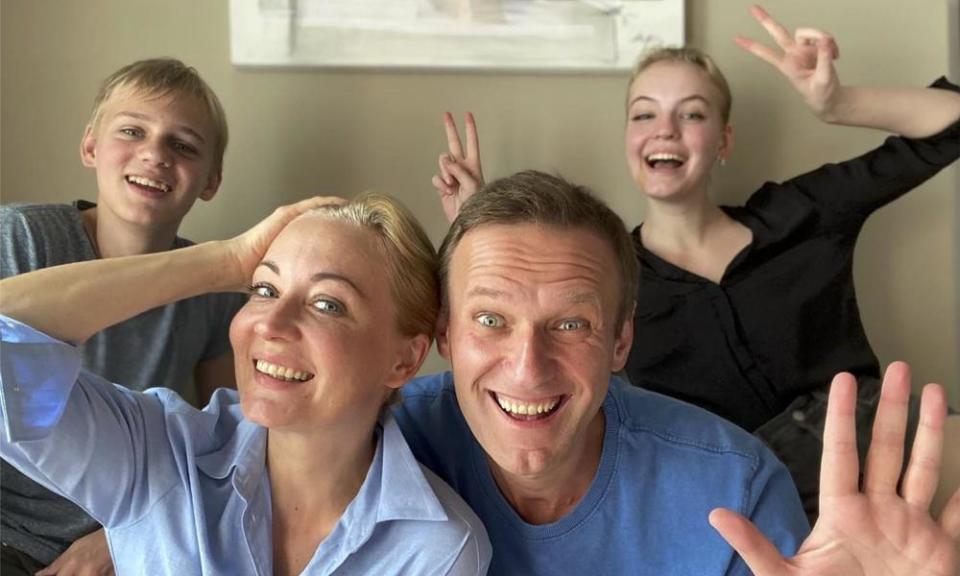Poison squad stalked Alexei Navalny on 40 flights, says Bellingcat investigator

Less than five months after an apparent novichok poisoning put him in a coma, Russian opposition leader Alexei Navalny was planning to fly into Moscow on Sunday, defying threats by Russian officials that he would be arrested and jailed immediately on arrival.
“Russia is my country, Moscow is my city. I miss it,” wrote Navalny in an Instagram post.
The announcement has sent the Russian authorities into a scramble, with the prison service saying he will be arrested for failing to appear for a parole hearing while poisoned. Vnukovo airport has placed restrictions on journalists reporting inside the terminal, and the authorities have warned supporters not to gather.
When Navalny emerged from a coma in Berlin, where he had been airlifted from the Siberian city of Omsk in August, he immediately accused President Vladimir Putin of being behind the attack. But what followed was remarkable: Navalny, together with the investigative outfit Bellingcat, put forward detailed accusations that a “poison squad” working for the FSB security services had tracked the opposition politician over several years and then attacked him.
The bulk of the work was done by Christo Grozev, a Bulgarian Bellingcat researcher based in Vienna. He was able to purchase flight records and phone data on the black market, due to Russia’s porous data protection standards, and searched for passengers on flights to the same cities where Navalny travelled, matching them with other data about known operatives. In November, when Navalny was recuperating in the German countryside, Grozev visited to compare FSB travel records with Navalny’s trips. The match-up was striking.

“On this photo you can see what a modern-day Sherlock Holmes looks like,” wrote Navalny as the caption to an Instagram photograph with Grozev in mid-December. “We saw the guy work it all out, just with a phone, a laptop and the internet.”
When the pieces of the puzzle began falling into place, Grozev had an enormous rush of adrenaline. “I couldn’t sleep. I just couldn’t believe that the evidence was so clear,” he said in an interview in Vienna. “Usually I have to spend a much longer time assessing and digging, and here there were 34 different flights. There was statistically zero chance this could be a coincidence.”
Since then, he has identified six more trips made by agents from the team tracking Navalny using different aliases, taking the total number of trips in which Navalny had accompanying officers from the FSB team to 40. “Clearly there was no expectation they would ever be discovered. But it’s impossible not to leave traces in today’s world. If you were there, you leave a trace,” said Grozev.
In a remarkable episode, Navalny then called one of the men, pretending to be an aide to a high-ranking FSB officer conducting an internal investigation into why the poisoning went wrong, and got him to admit many of the details of the plot, including the fact that the poison was probably applied via his underpants.
There has been almost no response from the Russian authorities on the very specific and detailed allegations, save for denials and bluster. Dmitry Polyanskiy, the deputy head of Russia’s UN mission, wrote on Twitter: “How can a sane person believe in such nonsense?” He accused Navalny and Bellingcat of being operated by western intelligence.
Bellingcat was set up by the blogger Eliot Higgins a decade ago and gained prominence with a series of investigations over Libya, Syria and Russia’s involvement in the war in Ukraine.
It now has a paid staff of 20, though Grozev said his work was on a voluntary basis. He was insistent that tip-offs from intelligence services, directly or indirectly, had not been the basis for any of the major Bellingcat investigations. The organisation received hundreds of tip-offs a day, said Grozev, but even after filtering out the obvious spam and provocations, they were still “90% crazy stuff”.
He said to crack the Navalny case, he spent about $30,000 (£22,000) in fees to Russian data brokers to provide phone and flight records. It is a dubious method, but one which undoubtedly brings results and is sometimes used by Russian journalists. Since the Navalny story broke, many dealers in this murky market have broken off contact with Bellingcat.
“People are doing their due diligence much more thoroughly now. If you’re a criminal, that’s fine and they’re happy to sell to you; if you’re a journalist, no way,” said Grozev.
Still, there may be more revelations to come. In the aftermath of the Navalny investigation, Grozev posted data of the full flight history of the known aliases for the men in the poisoning squad on Twitter, to see if their travel at times when they were not tailing Navalny could be linked to other unexplained illnesses or deaths. This has resulted in several promising leads, and he hopes to release the allegations soon.
Grozev, who visited Navalny in Berlin this week, said the politician acknowledged he might end up being jailed for a serious length of time on his return to Russia. “For him it’s not even a choice. He told me back in November he would return in January, and he stuck to it.”

 Yahoo Finance
Yahoo Finance 